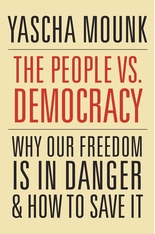 Yascha Mounk’s The People vs. Democracy argues that while liberals took liberalism’s permanence for granted, voters became “fed up with liberal democracy itself,” notes Sohrab Ahmari. Mounk has also collected mountains of public-opinion data, mainly from the World Values Survey, which shows a deeper transformation: People in the U.S. and Europe increasingly reject democratic principles and even hanker for strongman authority. Mounk [a contributor to the National Endowment for Democracy’s Journal of Democracy] thinks there are two factors at play in these attitudes, he writes for Commentary:
Yascha Mounk’s The People vs. Democracy argues that while liberals took liberalism’s permanence for granted, voters became “fed up with liberal democracy itself,” notes Sohrab Ahmari. Mounk has also collected mountains of public-opinion data, mainly from the World Values Survey, which shows a deeper transformation: People in the U.S. and Europe increasingly reject democratic principles and even hanker for strongman authority. Mounk [a contributor to the National Endowment for Democracy’s Journal of Democracy] thinks there are two factors at play in these attitudes, he writes for Commentary:
- The first is the emergence of illiberal democracy, or “democracy without rights,” as a serious rival to the current order. Vladimir Putin in Russia, Recep Tayyip Erdogan in Turkey, Narenda Modi in India, and Viktor Orbán in Hungary, among others, exemplify this model. Once elected, these leaders chip away at individual rights and independent institutions until democracy is all but hollowed out and it becomes nigh impossible to remove the ruling party from office. ….
- The second factor is undemocratic liberalism, or “rights without democracy.” Here Mounk has in mind technocratic liberalism’s drive to remove an ever-growing share of policy decisions from the purview of voters and their elected representatives. This has been necessitated by the complexity of contemporary problems such as climate change and international trade, Mounk contends. Yet rights without democracy has generated mistrust and cynicism. Liberals, he says, should aim to “strike a better balance between expertise and responsiveness to the popular will.”







